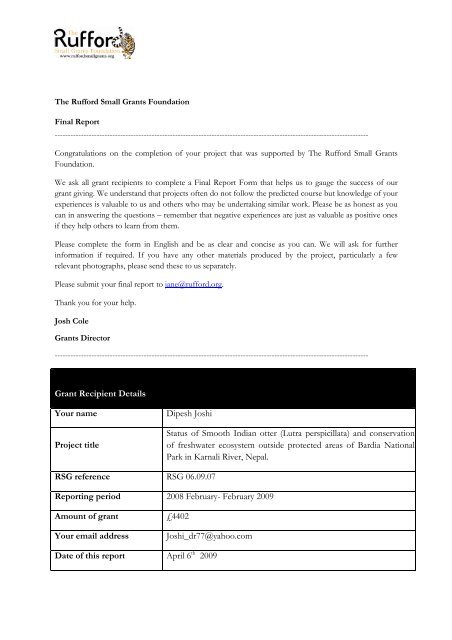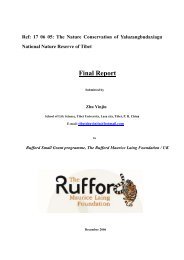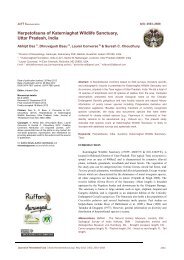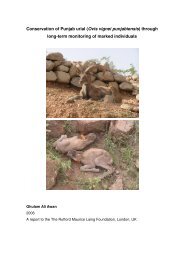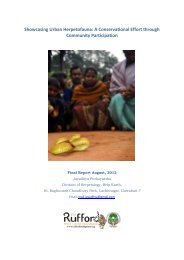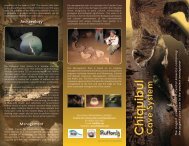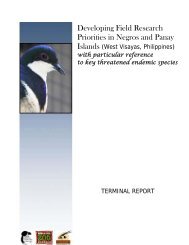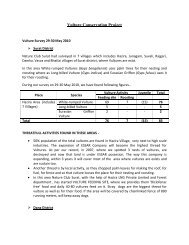Final Report - The Rufford Small Grants Foundation
Final Report - The Rufford Small Grants Foundation
Final Report - The Rufford Small Grants Foundation
Create successful ePaper yourself
Turn your PDF publications into a flip-book with our unique Google optimized e-Paper software.
<strong>The</strong> <strong>Rufford</strong> <strong>Small</strong> <strong>Grants</strong> <strong>Foundation</strong><br />
<strong>Final</strong> <strong>Report</strong><br />
------------------------------------------------------------------------------------------------------------------------<br />
Congratulations on the completion of your project that was supported by <strong>The</strong> <strong>Rufford</strong> <strong>Small</strong> <strong>Grants</strong><br />
<strong>Foundation</strong>.<br />
We ask all grant recipients to complete a <strong>Final</strong> <strong>Report</strong> Form that helps us to gauge the success of our<br />
grant giving. We understand that projects often do not follow the predicted course but knowledge of your<br />
experiences is valuable to us and others who may be undertaking similar work. Please be as honest as you<br />
can in answering the questions – remember that negative experiences are just as valuable as positive ones<br />
if they help others to learn from them.<br />
Please complete the form in English and be as clear and concise as you can. We will ask for further<br />
information if required. If you have any other materials produced by the project, particularly a few<br />
relevant photographs, please send these to us separately.<br />
Please submit your final report to jane@rufford.org.<br />
Thank you for your help.<br />
Josh Cole<br />
<strong>Grants</strong> Director<br />
------------------------------------------------------------------------------------------------------------------------<br />
Grant Recipient Details<br />
Your name Dipesh Joshi<br />
Project title<br />
RSG reference RSG 06.09.07<br />
<strong>Report</strong>ing period 2008 February- February 2009<br />
Amount of grant £4402<br />
Your email address Joshi_dr77@yahoo.com<br />
Date of this report April 6 th 2009<br />
Status of Smooth Indian otter (Lutra perspicillata) and conservation<br />
of freshwater ecosystem outside protected areas of Bardia National<br />
Park in Karnali River, Nepal.
1. Please indicate the level of achievement of the project’s original objectives and include any<br />
relevant comments on factors affecting this.<br />
<strong>The</strong>re were two major objectives of the project planed to be achieved through numerous activities. <strong>The</strong>se<br />
two objectives are mentioned in the table below with additional comments.<br />
Objective<br />
Assessment of status,<br />
distribution and<br />
threats facing the<br />
smooth-coated Indian<br />
otter<br />
Aquatic biodiversity<br />
conservation<br />
awareness focussing<br />
on major species like<br />
Ganges river<br />
dolphins, crocodiles<br />
and gharials outside<br />
the protected areas in<br />
Karnali River<br />
Not<br />
achieved<br />
Partially<br />
achieved<br />
Fully<br />
achieved<br />
Comments<br />
√ A detailed study was carried out for this<br />
objective. This was the first study on<br />
Otters in the area and thus will be a basis<br />
to monitor changes in future and will also<br />
be a reference for further studies on the<br />
subject matter.<br />
Though the objective also mentions an<br />
assessment of status of otters, but it was<br />
realized that this was an extremely<br />
difficult and time consuming in case of<br />
such animals and thus assessment of<br />
distribution of the animal was achieved<br />
and regarded as the crucial objective for<br />
future conservation.<br />
√ Awareness activities were carried out as<br />
planed but this is one objective which can<br />
hardly be fully achieved due to various<br />
factors; the major one being difficulty in<br />
quantifying the level of awareness and<br />
changes in these levels.<br />
But ample focus was placed on the species<br />
and ecosystem as a whole to achieve this<br />
target. Further, any future activities can be<br />
based on existing arrangements that are<br />
already in place for awareness rather than<br />
trying to set up new structures which can<br />
be time consuming, complicated and as<br />
opposed by the local communities
2. Please explain any unforeseen difficulties that arose during the project and how these were<br />
tackled (if relevant).<br />
<strong>The</strong> initial project planning had to be modified and this resulted in project extension by a couple of<br />
months. <strong>The</strong> project was expected and planned to start in December 2007 when the proposal was<br />
submitted but as the grant was made and released only by mid January 2008, the project started only<br />
towards the end of February. This ultimately caused some inconveniences in detailed survey was could<br />
not be undertaken according to the initial plan due to monsoon. Similarly, awareness programs were<br />
postponed as schools were closed for the monsoon. <strong>The</strong>se inconveniences were tackled by adjusting the<br />
whole schedule of the project which resulted in a delayed end.<br />
Furthermore, a change in exchange rate (devaluation of the pound sterling) caused some inconveniences<br />
in the project. A possible additional achievement of the project that could have been achieved by the<br />
project through publication of the study report as a booklet was not possible but to this deficit. Thus the<br />
budget allocated for printing was diverted to awareness activities. But it has been realized by the applicant<br />
that the proposal of publishing a short study report in the form of a booklet is not practically feasible as it<br />
turns out to be costly when a small number of such short reports are published.<br />
Additionally there were few cases of individuals who had higher expectations when the whole study and<br />
awareness program was presented to them as a project. This was because by this time, most communities<br />
and individuals in Nepal have a different understanding of the term “project”. <strong>The</strong>y assume such<br />
“projects” to be of longer duration having a large budget that can support community development<br />
activities rather than merely a study and awareness. But clarifications were made on this subject matter<br />
and the whole activity was presented as a study with adequate emphasis on awareness. As there were no<br />
previous cases of awareness and study on Otters in the area, it was later realized and accepted by the local<br />
communities positively. Thus it should be realized that a certain level of cooperation with local<br />
communities and main community leaders is very essential in any case. Lack of such cooperation and<br />
support may result in minimal interest of local communities which can lead false data and information.<br />
But a major supportive factor was the researcher’s previous long involvement in the area and with the<br />
local communities.<br />
3. Briefly describe the three most important outcomes of your project.<br />
<strong>The</strong> project was able to conduct survey of otters; an animal not widely recognized and acknowledged in<br />
conservation in Nepal. <strong>The</strong> study area is also of crucial importance being located between two large<br />
protected areas of high ecological importance.<br />
Similarly, a very informative booklet was published on otters and this was highly appreciated by children<br />
at the field level and were also distributed by WWF Nepal’s central office. In this way, WWF also<br />
acknowledged the importance of awareness in this narrow field. A poster was also published on three<br />
important species of the study area; Ganges River dolphins, Gharial and Otters. A greater level of<br />
awareness was generated among the local communities mainly school and out of school children. Even<br />
school children were able to identify major threats and possible solutions at local level for freshwater<br />
conservation. Additionally, the local assistants involvement and their personal achievements were also a<br />
major achievement for the project. <strong>The</strong>y were informed and oriented on use of instruments such as GPS<br />
and were also able to realize the importance of their own knowledge in scientific researches.
4. Briefly describe the involvement of local communities and how they have benefited from the<br />
project (if relevant).<br />
Local communities mainly benefited from the awareness activities of the project. Additionally, the local<br />
assistants who were some of the most committed people in conservation in the area (one of them being a<br />
person who was attacked by a tiger that caused a permanent loss of sight of one of his eyes) were able to<br />
gain some income from the project directly. But their indirect achievement was the major part. As the<br />
local residents of the area these people are well acquainted with wildlife and biodiversity of the whole<br />
area. Thus they were a vital part of the whole project. <strong>The</strong>y were also able to realize the importance of<br />
their knowledge during the project as these people are in most cases more skilled than some trained<br />
ecologists. Thus the project made them realize through constant acknowledgement that their knowledge<br />
counts. At the same time, they were oriented on the use and importance of scientific equipments such as<br />
GPS. This will strengthen their capacities, interest and involvement in future conservation activities in the<br />
area.<br />
5. Are there any plans to continue this work?<br />
Yes, there are plans to continue this work in future through a possible 2 nd RSG. <strong>The</strong> applicant plans to<br />
develop a Survey manual for Otters in coordination with some national conservation organizations as a<br />
continuation of this project. This manual can be very helpful for future researchers in Nepal and even in<br />
the region. <strong>The</strong>re is a lack of such manuals in aquatic or semi-aquatic animals. Higher coordination will be<br />
established with WWF Nepal in this effort as it has been implementing projects in the present project<br />
area. Further, awareness activities are planned to be continued through the existing local institutions in<br />
the area which has a strong local level presence and influence in conservation. <strong>The</strong>re has also been a<br />
certain level of commitment from WWF Nepal’s project office to work in freshwater issues to build on<br />
what they have already initiated.<br />
6. How do you plan to share the results of your work with others?<br />
<strong>The</strong> study report could not be published as a book because it was too short for a publication which would<br />
not be cost effective. But a paper has been written on the study and will be submitted to some national<br />
and regional journals in near future. Results will also be disseminated through local and national<br />
organizations in near future. Copies of the draft report of the study were also handed over to major<br />
conservation organizations at local and national level in Nepal. Initial findings of the study were also<br />
made public through interactive forums at local level during group discussions and among school<br />
children. Copies of the final study report which also includes maps of the study area along with<br />
distribution of Otters will be provided to all major stakeholders through whatever possible forms.
7.Timescale: Over what period was the RSG used? How does this compare to the anticipated or<br />
actual length of the project?<br />
<strong>The</strong> project was planned for 11months but due to some changes as mentioned in the preceding sections<br />
of the report, it was used till a later date. Thus there has been an extended period for the project. It is<br />
also to some extent due to unreliable monsoon on which the otter survey periods and opening of schools<br />
for awareness and informative activities depends. But personal experience shows that a well planned<br />
schedule and timely release of budget could make the whole project shorter if carried out intensively.<br />
8. Budget: Please provide a breakdown of budgeted versus actual expenditure and the reasons<br />
for any differences. All figures should be in £ sterling, indicating the local exchange rate used.<br />
S Particulars Requested Spent<br />
Remarks<br />
N<br />
£ NRs £ NRs<br />
sterling*<br />
sterling**<br />
1 Lead researcher 480 62880 465 56212 This amount was reduced as far as<br />
possible to compensate the<br />
2 Local assistants 720 94320 780 94320<br />
difference that resulted from<br />
differences in exchange rates.<br />
This amount was what it was<br />
initially planned as it cannot be<br />
readjusted in any case.<br />
3 Local travel 492 64452 485 58694<br />
4 Field supplies 763 99953 620 75000 <strong>The</strong> quality and quantity were<br />
compromised to some extent to<br />
cover the budget deficiencies.<br />
5 Communication 76 9956 74 8995<br />
6 Local<br />
consultations<br />
7 Awareness<br />
programs<br />
8 Study report<br />
preparation<br />
9 Information<br />
dissemination<br />
191 25021 288 34855 It was higher than planned due to<br />
greater number of events<br />
916 119996 1134 137230 Publication cost was marginally<br />
increased compared to as planned<br />
573 75063 264 32000 Publication of the report which<br />
could have been an achievement<br />
was not possible due to<br />
inadequacy of budget. This<br />
amount was readjusted in<br />
191 25021 248 30000<br />
Awareness and dissemination.<br />
<strong>The</strong> costs was almost as planned.<br />
TOTAL 4402 576662 4358 527306<br />
NRs.<br />
£<br />
sterling<br />
Requested 576662 4402<br />
Received 532642 4402<br />
Spent 527306 4358<br />
Balance 5336 ≈45<br />
* Exchange rate when applied was 1£=NRs 131<br />
** Exchange rate when received and spent was 1£=NRs 121
9. Looking ahead, what do you feel are the important next steps?<br />
Freshwater ecosystems and major species need more focus in a country like Nepal where conservation is<br />
usually driven by some species like tigers, rhinos, elephants and snow leopards. So higher importance and<br />
an integrated approach is vital in near future. Large conservation organizations should also focus more on<br />
such areas rather than only on terrestrial ecosystems. In future projects and activities, greater coordination<br />
with such organizations is necessary. At the same time it is also essential to enhance capacity building<br />
activities in this field in countries like Nepal where there is inadequate focus. This becomes more<br />
pertinent also because of the fact that freshwater ecosystems are a major part of rural livelihoods mainly<br />
through food and irrigation along with providing other ecosystem services. Thus I personally think that<br />
RSG provides appropriate platform and funds for capacity building through these grants for research and<br />
awareness. Along with this awareness needs an additional focus. Though the changes in level of<br />
awareness is hard to quantify but it should always be the most important and fundamental part of<br />
conservation efforts.<br />
I think it is crucial to extrapolate this effort into larger arenas and areas meaning that bigger donor<br />
organizations also need to focus and there is also a need to focus on larger areas. Furthermore, more<br />
integrated approaches in research and conservation are required in this sector. <strong>The</strong> issues need to be<br />
linked up with livelihood issues and thus it requires an integrated effort. A certain level of coordination<br />
has already been established as the local partners of the project were also the implementers of WWF<br />
Nepal’s Terai Arc Landscape project. Even at the central level, a degree of cooperation was developed<br />
with WWF Nepal due to previous personal and professional involvements with WWF Nepal. This<br />
network needs to be exploited for larger efforts in the future. Thus in a nutshell, a continuation and a<br />
higher level of coordination is necessary and additionally more attention needs to be focussed in future on<br />
publications that are accessible to a larger audiences.<br />
10. Did you use the RSGF logo in any materials produced in relation to this project? Did the<br />
RSGF receive any publicity during the course of your work?<br />
Posters and booklets were published from the project budget as a part of awareness program. <strong>The</strong>se<br />
publications have also been sent to RSG through post. Ample focus was paid to the donor of the project<br />
during the project activities but necessary caution was also taken not to over illustrate RSG. This was<br />
necessary in some cases few locals can be reactive when they have to contribute during long group<br />
discussions without any incentives, specially when they learn that an international organization is funding<br />
such an activity.. Thus objectives of the project and how it was financed were clearly and cautiously<br />
mentioned during such mass events. But publications provided ample importance to RSG logo.<br />
<strong>The</strong> poster had an appropriate logo on it while the booklet on Otters had appropriately placed RSG logo<br />
on the front and back cover. Details of the RSG activities and their budget allocation to various sectors<br />
(as shown by a pie chart in the website for 2007/08) was also published with additional information about<br />
RSG. This was of a major interest among local NGOs among whom the booklets were also distributed.<br />
Most of them had rarely heard of this organization also due to the fact that RSG does not fund larger<br />
community based conservation projects. Clarifications were given to such inquisitive individuals and<br />
organizations that RSG normally focussed on individual capacity enhancement through research and<br />
awareness.
11. Any other comments?<br />
A major problem that could have occurred was a devaluation of the pound sterling. <strong>The</strong> devaluation<br />
resulted in a difference of NRs. 40,000 between what was requested and what was received. Though this<br />
did occur between project application and grant receiving period, the estimated cost was still able to cover<br />
the actual costs of the project mainly due to the fact that some adjustments were made on the quality of<br />
some equipments and materials purchased for the project. But no adjustments were made in case of<br />
number of events to be carried out, number of surveys and discussions to be held and prizes for children<br />
during school level competitions.<br />
12. I agree to this report being published on the <strong>Rufford</strong> <strong>Small</strong> <strong>Grants</strong> website<br />
Signed (or print name): Dipesh Joshi


